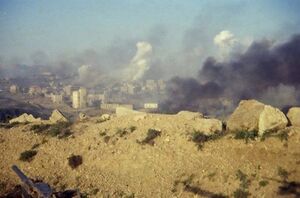Rice and Oil War (Eordisverse)
The Rice and Oil War (Quenminese: Chiến tranh Gạo và Dầu; Tamauese: สงครามข้าวและน้ำมัน: S̄ngkhrām k̄ĥāw læa n̂ảmạn) was a conflict in Southeast Asianna that raged from July 12, 1995 to September 1, 1997. It was fought between Quenmin and Tamau with support from the United Kingdom, and the Opposition Movement for the Permanent Independence of Tamau and ARPAGHARCON.
The conflict's primary causes were of the laws on increased military spending, lowering minimum wages, and suppression of labor unions implemented by the stratocratic government of Prime Minister Nguyễn-Thạch Sĩ Chiến, and the Pagayabas Accords that enabled major Quenminese corporations to establish in Tamau contributing facilities to help augment Tamau's economy after the Commodities Crisis of 1989, but was actually used as a means of directly controlling over half of Tamau's economic resources; particularly, rice and petroleum.
Background
Government Protests by ARPAGHARCON and the Public
Pagayabas Accords for Economic Cooperation and Subsequent Protests
- Prime Minister Nguyễn-Thạch Sĩ Chiến condemned Phung Toan Dac Kien for not doing enough
- Set out by the stratocratic government
- Ducal Government was hesitant to sign it, but eventually did so
Attacks in Nakhon Nayyao by the FKPXT
Ducal Government's Attempted Talks to Revoke the Agreement
- Even though the Accords were producing contributions, it got increasingly unpopular after its true intentions were revealed visually and physically
- Government tries to convince the stratocracy to repeal it, but some cabinet members prevented them from carrying out the talks
Attempted Assassination of the Ducal Government by the FKPXT
Consolidated Cooperation Between ARPAGHARCON and the FKPXT
- Divided opinion in ARPAGHARCON and the FKPXT alike
Martial Law Implemented in Both Countries
- After the Hue Tinh-Yen Tau Incident
The War
1995: Early Operations
Late 1995-Mid-1997: Full-Scale War
1997: Gradual Exhaustion
Aftermath
Yen Chau Accords
Aftermath
- POLMANATS loses its political power
